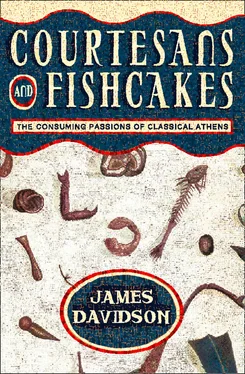This ancient discourse falls readily within the boundaries set by the two sides of the modern controversy, turning from drink to the community of drinkers and back again to drink, enabling us to escape in the first place some of Baudelaire’s most trenchant criticisms and present a brief survey ‘de tous les vins, de leurs différentes qualités…’
The vine was familiar all over mainland Greece and in those coastal enclaves from Catalonia to the Crimea that the Greeks colonized. In fact, wine-drinking was considered nothing less than a symbol of Greek cultural identity. It was a mark of their barbarism that the barbarians drank beer. If they did know of wine, and the Greeks acknowledged that other cultures were not totally ignorant of it, they misused it. The wine itself, in the raw and undiluted form rarely tasted by the Greeks, was often sweet and thanks to hot weather and low yields probably towards the upper end of the scale of potency at 15–16 per cent as opposed to the 12.5 per cent which is normal today. It usually had bits of grape and vine debris floating in it and needed to be sieved before being mixed or poured out. This will have made red wines correspondingly dark in colour and somewhat tannic. The scent of ancient wine was said to have a powerful effect on wine-lovers and was often compared to the scent of flowers. Some other aromas may have been unfamiliar to the modern nose. For a start, the wine absorbed the taste of the container in which it had been carried or stored; not the oak that lends to modern wines their characteristic vanilla flavours, but pitch or resin used to seal amphoras and, on occasion, the sheep and goats that provided the raw material for wine-skins. Other items were sometimes added at various points in the process of manufacturing and preparation including salt water, aromatic herbs, perfume and in one case honey and dough. Aristotle in a fragment of his treatise On Drunkenness mentions drinking wine from a ‘Rhodes jar’ which was prepared with an infusion of myrrh and rushes. Apparently when heated the vessel lessened the intoxicating power of the liquid inside.
According to Mnesitheus, three colours of wine were differentiated, ‘black’, ‘white’ and kirrhos , or amber. The white and amber wines could be either sweet or dry, the ‘black’ could also be made ‘medium’. The Hippocratic treatise On Diet categorizes wines also as ‘fragrant’ or ‘odourless’, ‘slender’ or ‘fat’, and ‘strong’ or ‘weaker’. Theophrastus says wines were sometimes blended. 4 Конец ознакомительного фрагмента. Текст предоставлен ООО «ЛитРес». Прочитайте эту книгу целиком, купив полную легальную версию на ЛитРес. Безопасно оплатить книгу можно банковской картой Visa, MasterCard, Maestro, со счета мобильного телефона, с платежного терминала, в салоне МТС или Связной, через PayPal, WebMoney, Яндекс.Деньги, QIWI Кошелек, бонусными картами или другим удобным Вам способом.
The Greeks, unlike the Romans after them, seem to have had no appreciation of particular vintages, but certainly recognized the value of ageing, something which amazed antiquarians as late as the early eighteenth century, when wines usually deteriorated quickly. This misunderstanding seems to be a simple consequence of the fact that in the early Middle Ages readily sealable clay amphoras fell out of favour to be replaced by less air-tight receptacles. The age of wine was a matter of some importance to connoisseurs, inspiring the gourmand Archestratus to heights of purple poetastery that make modern connoisseurs look prosaic:
Then, when you have drawn a full measure for Zeus Saviour, you must drink an old wine, bearing on its shoulders a head hoary indeed, a wine whose wet curls are crowned with white flowers, a wine begat of wave-girdled Lesbos. And Bybline, the wine that hails from holy Phoenicia, I recommend, though I do not place it in the same rank as the other. For if you were not previously on intimate terms and it catches your taste-buds unaware, it will seem more fragrant than the Lesbian, and it does retain its bouquet for a prodigious length of time, but when you come to drink it you will find it inferior by far, while in your estimation the Lesbian will soar, worthy not merely of wine’s prerogatives but of ambrosia’s. Some swagger-chattering gas-bags may scoff that Phoenician was ever the sweetest of wines but to them I pay no heed … The wine of Thasos too makes noble drinking, provided it be old with the fair seasons of many years.
Wine’s ability to age well drew some unfavourable comparisons with the human species. A character in a play of Eubulus, for instance, remarks on how the hetaeras esteem old wine, but not old men. A fragment of Cratinus conjures up a more sophisticated deployment of the human lifetime analogy. He talks of ‘Mendaean wine coming of age’ ( hēbōnta , literally ‘in bloom’ or ‘pubescent’), thereby bringing to mind modern maturity charts of the ‘life’ of a wine divided into periods of maturation: ‘Ready’, ‘Peak’, ‘Tiring’, ‘Decline’. 5 Конец ознакомительного фрагмента. Текст предоставлен ООО «ЛитРес». Прочитайте эту книгу целиком, купив полную легальную версию на ЛитРес. Безопасно оплатить книгу можно банковской картой Visa, MasterCard, Maestro, со счета мобильного телефона, с платежного терминала, в салоне МТС или Связной, через PayPal, WebMoney, Яндекс.Деньги, QIWI Кошелек, бонусными картами или другим удобным Вам способом.
The vast bulk of the wine consumed was undistinguished local produce from the harvest of small unspecialized holdings. This was what the Athenians called trikotylos , or ‘litre wine’ (literally, three half-pints) because, according to the lexicographer Hesychius, you could get three half-pint measures of it for only an obol. Some, however, was of a much higher quality imported from areas famous for their wines and grown on large estates. These wines are often found listed along with other fine foods in comedy, although the top rank contains rather fewer specimens than the number of fishes, for instance, at the poets’ command, rarely amounting to more than three or four at a time. Membership of this elite is not always consistent, but the wines of Thasos, Chios and Mende, a city in the Chalcidice, are the most prominent for most of the classical period. These are joined by the wines of Lesbos which are occasionally found in lists as early as the fifth century BCE, although Pliny has the impression that their reputation dated only from the end of the fourth. Characters in the plays discourse freely on the peculiar qualities of each wine, its characteristic colour and scent, its sweetness, as in this speech of Dionysus from a play of Hermippus: ‘With … Mendaean wine the gods themselves wet their soft beds. And then there is Magnesian, generous, sweet and smooth, and Thasian upon whose surface skates the perfume of apples; this I judge by far the best of all the wines, except for blameless, painless Chian.’ 6 Конец ознакомительного фрагмента. Текст предоставлен ООО «ЛитРес». Прочитайте эту книгу целиком, купив полную легальную версию на ЛитРес. Безопасно оплатить книгу можно банковской картой Visa, MasterCard, Maestro, со счета мобильного телефона, с платежного терминала, в салоне МТС или Связной, через PayPal, WebMoney, Яндекс.Деньги, QIWI Кошелек, бонусными картами или другим удобным Вам способом.
Читать дальше












